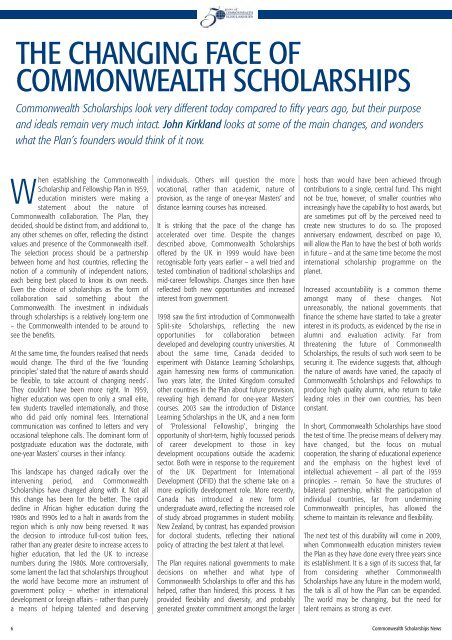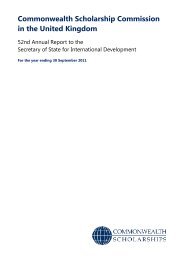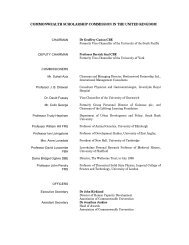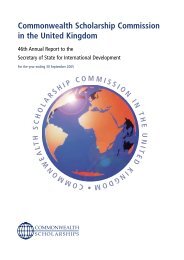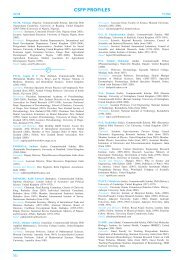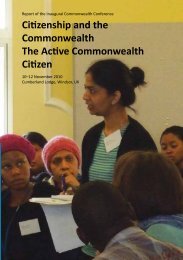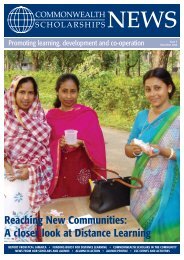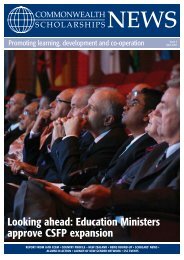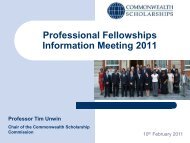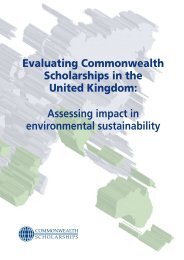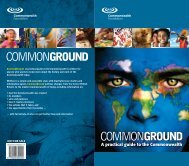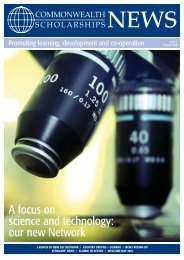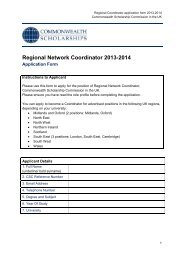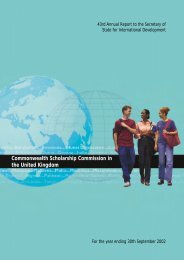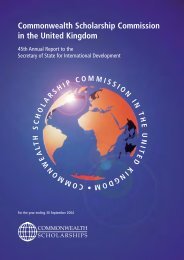Issue 7 - Commonwealth Scholarship Commission in the United ...
Issue 7 - Commonwealth Scholarship Commission in the United ...
Issue 7 - Commonwealth Scholarship Commission in the United ...
You also want an ePaper? Increase the reach of your titles
YUMPU automatically turns print PDFs into web optimized ePapers that Google loves.
THE CHANGING FACE OF<br />
COMMONWEALTH SCHOLARSHIPS<br />
<strong>Commonwealth</strong> <strong>Scholarship</strong>s look very different today compared to fifty years ago, but <strong>the</strong>ir purpose<br />
and ideals rema<strong>in</strong> very much <strong>in</strong>tact. John Kirkland looks at some of <strong>the</strong> ma<strong>in</strong> changes, and wonders<br />
what <strong>the</strong> Plan’s founders would th<strong>in</strong>k of it now.<br />
When establish<strong>in</strong>g <strong>the</strong> <strong>Commonwealth</strong><br />
<strong>Scholarship</strong> and Fellowship Plan <strong>in</strong> 1959,<br />
education m<strong>in</strong>isters were mak<strong>in</strong>g a<br />
statement about <strong>the</strong> nature of<br />
<strong>Commonwealth</strong> collaboration. The Plan, <strong>the</strong>y<br />
decided, should be dist<strong>in</strong>ct from, and additional to,<br />
any o<strong>the</strong>r schemes on offer, reflect<strong>in</strong>g <strong>the</strong> dist<strong>in</strong>ct<br />
values and presence of <strong>the</strong> <strong>Commonwealth</strong> itself.<br />
The selection process should be a partnership<br />
between home and host countries, reflect<strong>in</strong>g <strong>the</strong><br />
notion of a community of <strong>in</strong>dependent nations,<br />
each be<strong>in</strong>g best placed to know its own needs.<br />
Even <strong>the</strong> choice of scholarships as <strong>the</strong> form of<br />
collaboration said someth<strong>in</strong>g about <strong>the</strong><br />
<strong>Commonwealth</strong>. The <strong>in</strong>vestment <strong>in</strong> <strong>in</strong>dividuals<br />
through scholarships is a relatively long-term one<br />
– <strong>the</strong> <strong>Commonwealth</strong> <strong>in</strong>tended to be around to<br />
see <strong>the</strong> benefits.<br />
At <strong>the</strong> same time, <strong>the</strong> founders realised that needs<br />
would change. The third of <strong>the</strong> five ‘found<strong>in</strong>g<br />
pr<strong>in</strong>ciples’ stated that ‘<strong>the</strong> nature of awards should<br />
be flexible, to take account of chang<strong>in</strong>g needs’.<br />
They couldn’t have been more right. In 1959,<br />
higher education was open to only a small elite,<br />
few students travelled <strong>in</strong>ternationally, and those<br />
who did paid only nom<strong>in</strong>al fees. International<br />
communication was conf<strong>in</strong>ed to letters and very<br />
occasional telephone calls. The dom<strong>in</strong>ant form of<br />
postgraduate education was <strong>the</strong> doctorate, with<br />
one-year Masters’ courses <strong>in</strong> <strong>the</strong>ir <strong>in</strong>fancy.<br />
This landscape has changed radically over <strong>the</strong><br />
<strong>in</strong>terven<strong>in</strong>g period, and <strong>Commonwealth</strong><br />
<strong>Scholarship</strong>s have changed along with it. Not all<br />
this change has been for <strong>the</strong> better. The rapid<br />
decl<strong>in</strong>e <strong>in</strong> African higher education dur<strong>in</strong>g <strong>the</strong><br />
1980s and 1990s led to a halt <strong>in</strong> awards from <strong>the</strong><br />
region which is only now be<strong>in</strong>g reversed. It was<br />
<strong>the</strong> decision to <strong>in</strong>troduce full-cost tuition fees,<br />
ra<strong>the</strong>r than any greater desire to <strong>in</strong>crease access to<br />
higher education, that led <strong>the</strong> UK to <strong>in</strong>crease<br />
numbers dur<strong>in</strong>g <strong>the</strong> 1980s. More controversially,<br />
some lament <strong>the</strong> fact that scholarships throughout<br />
<strong>the</strong> world have become more an <strong>in</strong>strument of<br />
government policy – whe<strong>the</strong>r <strong>in</strong> <strong>in</strong>ternational<br />
development or foreign affairs – ra<strong>the</strong>r than purely<br />
a means of help<strong>in</strong>g talented and deserv<strong>in</strong>g<br />
<strong>in</strong>dividuals. O<strong>the</strong>rs will question <strong>the</strong> more<br />
vocational, ra<strong>the</strong>r than academic, nature of<br />
provision, as <strong>the</strong> range of one-year Masters’ and<br />
distance learn<strong>in</strong>g courses has <strong>in</strong>creased.<br />
It is strik<strong>in</strong>g that <strong>the</strong> pace of <strong>the</strong> change has<br />
accelerated over time. Despite <strong>the</strong> changes<br />
described above, <strong>Commonwealth</strong> <strong>Scholarship</strong>s<br />
offered by <strong>the</strong> UK <strong>in</strong> 1999 would have been<br />
recognisable forty years earlier – a well tried and<br />
tested comb<strong>in</strong>ation of traditional scholarships and<br />
mid-career fellowships. Changes s<strong>in</strong>ce <strong>the</strong>n have<br />
reflected both new opportunities and <strong>in</strong>creased<br />
<strong>in</strong>terest from government.<br />
1998 saw <strong>the</strong> first <strong>in</strong>troduction of <strong>Commonwealth</strong><br />
Split-site <strong>Scholarship</strong>s, reflect<strong>in</strong>g <strong>the</strong> new<br />
opportunities for collaboration between<br />
developed and develop<strong>in</strong>g country universities. At<br />
about <strong>the</strong> same time, Canada decided to<br />
experiment with Distance Learn<strong>in</strong>g <strong>Scholarship</strong>s,<br />
aga<strong>in</strong> harness<strong>in</strong>g new forms of communication.<br />
Two years later, <strong>the</strong> <strong>United</strong> K<strong>in</strong>gdom consulted<br />
o<strong>the</strong>r countries <strong>in</strong> <strong>the</strong> Plan about future provision,<br />
reveal<strong>in</strong>g high demand for one-year Masters’<br />
courses. 2003 saw <strong>the</strong> <strong>in</strong>troduction of Distance<br />
Learn<strong>in</strong>g <strong>Scholarship</strong>s <strong>in</strong> <strong>the</strong> UK, and a new form<br />
of ‘Professional Fellowship’, br<strong>in</strong>g<strong>in</strong>g <strong>the</strong><br />
opportunity of short-term, highly focussed periods<br />
of career development to those <strong>in</strong> key<br />
development occupations outside <strong>the</strong> academic<br />
sector. Both were <strong>in</strong> response to <strong>the</strong> requirement<br />
of <strong>the</strong> UK Department for International<br />
Development (DFID) that <strong>the</strong> scheme take on a<br />
more explicitly development role. More recently,<br />
Canada has <strong>in</strong>troduced a new form of<br />
undergraduate award, reflect<strong>in</strong>g <strong>the</strong> <strong>in</strong>creased role<br />
of study abroad programmes <strong>in</strong> student mobility.<br />
New Zealand, by contrast, has expanded provision<br />
for doctoral students, reflect<strong>in</strong>g <strong>the</strong>ir national<br />
policy of attract<strong>in</strong>g <strong>the</strong> best talent at that level.<br />
The Plan requires national governments to make<br />
decisions on whe<strong>the</strong>r and what type of<br />
<strong>Commonwealth</strong> <strong>Scholarship</strong>s to offer and this has<br />
helped, ra<strong>the</strong>r than h<strong>in</strong>dered, this process. It has<br />
provided flexibility and diversity, and probably<br />
generated greater commitment amongst <strong>the</strong> larger<br />
hosts than would have been achieved through<br />
contributions to a s<strong>in</strong>gle, central fund. This might<br />
not be true, however, of smaller countries who<br />
<strong>in</strong>creas<strong>in</strong>gly have <strong>the</strong> capability to host awards, but<br />
are sometimes put off by <strong>the</strong> perceived need to<br />
create new structures to do so. The proposed<br />
anniversary endowment, described on page 10,<br />
will allow <strong>the</strong> Plan to have <strong>the</strong> best of both worlds<br />
<strong>in</strong> future – and at <strong>the</strong> same time become <strong>the</strong> most<br />
<strong>in</strong>ternational scholarship programme on <strong>the</strong><br />
planet.<br />
Increased accountability is a common <strong>the</strong>me<br />
amongst many of <strong>the</strong>se changes. Not<br />
unreasonably, <strong>the</strong> national governments that<br />
f<strong>in</strong>ance <strong>the</strong> scheme have started to take a greater<br />
<strong>in</strong>terest <strong>in</strong> its products, as evidenced by <strong>the</strong> rise <strong>in</strong><br />
alumni and evaluation activity. Far from<br />
threaten<strong>in</strong>g <strong>the</strong> future of <strong>Commonwealth</strong><br />
<strong>Scholarship</strong>s, <strong>the</strong> results of such work seem to be<br />
secur<strong>in</strong>g it. The evidence suggests that, although<br />
<strong>the</strong> nature of awards have varied, <strong>the</strong> capacity of<br />
<strong>Commonwealth</strong> <strong>Scholarship</strong>s and Fellowships to<br />
produce high quality alumni, who return to take<br />
lead<strong>in</strong>g roles <strong>in</strong> <strong>the</strong>ir own countries, has been<br />
constant.<br />
In short, <strong>Commonwealth</strong> <strong>Scholarship</strong>s have stood<br />
<strong>the</strong> test of time. The precise means of delivery may<br />
have changed, but <strong>the</strong> focus on mutual<br />
cooperation, <strong>the</strong> shar<strong>in</strong>g of educational experience<br />
and <strong>the</strong> emphasis on <strong>the</strong> highest level of<br />
<strong>in</strong>tellectual achievement – all part of <strong>the</strong> 1959<br />
pr<strong>in</strong>ciples – rema<strong>in</strong>. So have <strong>the</strong> structures of<br />
bilateral partnership, whilst <strong>the</strong> participation of<br />
<strong>in</strong>dividual countries, far from underm<strong>in</strong><strong>in</strong>g<br />
<strong>Commonwealth</strong> pr<strong>in</strong>ciples, has allowed <strong>the</strong><br />
scheme to ma<strong>in</strong>ta<strong>in</strong> its relevance and flexibility.<br />
The next test of this durability will come <strong>in</strong> 2009,<br />
when <strong>Commonwealth</strong> education m<strong>in</strong>isters review<br />
<strong>the</strong> Plan as <strong>the</strong>y have done every three years s<strong>in</strong>ce<br />
its establishment. It is a sign of its success that, far<br />
from consider<strong>in</strong>g whe<strong>the</strong>r <strong>Commonwealth</strong><br />
<strong>Scholarship</strong>s have any future <strong>in</strong> <strong>the</strong> modern world,<br />
<strong>the</strong> talk is all of how <strong>the</strong> Plan can be expanded.<br />
The world may be chang<strong>in</strong>g, but <strong>the</strong> need for<br />
talent rema<strong>in</strong>s as strong as ever.<br />
6 <strong>Commonwealth</strong> <strong>Scholarship</strong>s News


